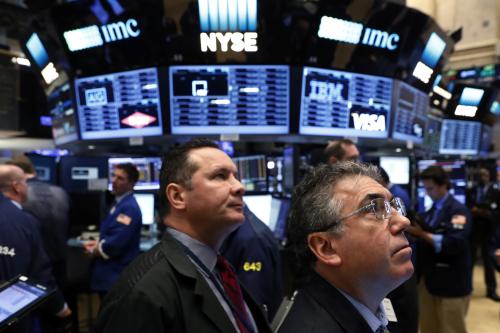This article originally appeared in Real Clear Markets on May 9, 2017.
Before last Friday’s employment release, some pessimistic observers feared a recession was near. The latest GDP release from the BEA showed real output growth slowed to a crawl in the first quarter, rising at an annual rate of only 0.7 percent. And that followed the report on March employment that had shown an abrupt slowdown in job growth. Alongside this economic news, the previously soaring stock market levelled off.
But the fear among pessimists of a looming recession, which was never convincing, was put to rest by last Friday’s employment report showing 211,000 net new jobs in April, and a very healthy average monthly job growth of 185,000 over the first four months of the year.
As a simple summary of the economic expansion’s health, we should accept the above trend growth in employment over the nearly flat real GDP growth. And as a general rule, we should prefer job growth over real GDP growth as a measure of overall economic activity because the GDP estimates may not accurately correct for seasonal variations and may not properly capture the changing composition and pricing of what we produce and consume.
Going behind the aggregate data, there have been few signs of an overall weakening in the economy. Though some sectors, such as autos, are softening, others, such as defense, construction and many services, are still growing steadily. And the global economy is now less of a drag on the U.S. than it has been. Until recently, weak growth abroad weighed on the U.S. expansion through the exchange rate and trade channels. In recent weeks, the dollar appreciation has stopped. And the present IMF forecasts for 2017 include continued better growth in Europe despite the uncertainties of Brexit and the immigration turmoil, and continued rapid expansion in the emerging market economies. Janet Yellen recently testified that the Fed believes the slowdown in GDP growth is temporary and that it expects to stay on its course of raising policy interest rates further during 2017.
But estimates of how far a healthy expansion can go are highly uncertain. The economy’s growth potential is somewhat greater than many had thought.
Even if the expansion is presently healthy, it has already lasted 8 years, which is old by historical standards. And even before the unemployment rate dropped to April’s 4.4 percent, many analysts believed the economy had reached full employment, which would limit the potential for further economic expansion. But estimates of how far a healthy expansion can go are highly uncertain. The economy’s growth potential is somewhat greater than many had thought. Through much of the present expansion, labor force participation rates declined faster than demographics alone would predict. In recent quarters, as job markets have tightened, the decline in participation has ceased. Furthermore, there is mixed evidence from recent decades about how low unemployment can go without generating accelerating inflation. The Fed is alert to both sides of its mandate, and the fact that it is not raising rates further now but still expects to do so during 2017 indicates it sees and welcomes continued expansion in the economy.
Do these economic prospects tell us anything useful about the stock market and do stock market prices inform our forecasts for the economy? The economy and the stock market affect each other in many ways. A strong expansion raises profits and opportunities for new investment. A rising stock market increases wealth and the optimism of both consumers and businesses. All these connections occur with variable lags. And, in general, market declines do not cause economic declines. But a big market drop could affect wealth and expectations enough to noticeably depress the economy. And some observers reason the surge in the importance of ETFs as a way of participating in the stock market could magnify downward shocks for many investors and, in turn, have more effect on the economy. While mutual funds attracted mainly long term investors, ETFs attract investors who are more likely to trade actively.
The great bull market of the 1990s ended when what we now call the dot-com bubble finally popped. Today, the prices of social media stocks and others related to the Silicon Valley industries (FANG is shorthand for four dominant firms in this category, Facebook, Apple, Netflix and Google), have risen to levels that resemble the star stocks of that earlier boom. Because of their success in the stock market, these high flying stocks are heavily weighted in ETFs indexed to a broad stock average or to growth or high tech stocks. The fear is that, if a correction starts in these stocks, the rush of selling by ETF investors could greatly steepen the stock price decline.
Would that be enough to push the economy into recession? It did in 2001 and the damage would likely be greater in today’s market.




Commentary
Op-edThere’s no recession, but a market correction could cause one
May 9, 2017